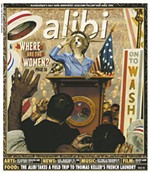Just Healthcare
During his family practice residency at University of New Mexico Hospital, Dr. Andru Ziwasimon said he became aware of the profound barriers and inflated costs of medical care for low-income and uninsured people, and he decided the best way to do his part to fix the problem was start a health clinic that offers primary care to uninsured patients.
"In a lot of ways our system of medicine is so corrupt in its values around money instead of taking care of patients." said Ziwasimon. "So I decided I wanted to practice medicine in a way that was respectful to my community and met the needs of the most vulnerable people."
After months of planning and while their humble stone and stucco office in a South Valley neighborhood of Albuquerque was still undergoing renovations, Ziwasimon, along with Sylvia Ledesma, Alma Olivas and with the help of countless volunteers, opened the Just Healthcare clinic in September.
The clinic operates on the principle that health care should be affordable and accessible to anyone. The goal, Ziwasimon said, is to integrate indigenous medicine (Ledesma's specialty), homeopathic and standard allopathic (prescribed drugs, minor surgery) practices, as well as create a clinic where community leaders can have a voice in the way health care is managed (Olivas' specialty).
Nobody pays up front. After being seen, people are asked for a $25 visit fee, and additional small fees for labs or medication. The average visit costs around $35, compared to comparable service at an emergency room for $400 or more, which is the only option for the growing stream of uninsured residents in Albuquerque. Lab costs and pharmaceuticals are priced at cost, without profit motive. To meet his own financial demands (medical school loans aren't cheap), Ziwasimon moonlights on the weekends as an emergency doctor in rural New Mexico.
"There's so much inflated cost in health care: supplies, drugs, visit charges, inflation built in to pay salaries of administrators and insurance billers," he says. "At this clinic we don't deal with the hassle and it saves us a huge amount of money. There's a belief out there that poor people don't pay their bills. But 80 percent pay us because it's a fair and affordable service."
A perfect case study was a 50-year-old man who called with full body ache and back pain and thought he had a kidney stone, because a friend told him those were the symptoms. It was 4 p.m. and the emergency room would have been his only option. At Just Healthcare, Ziwasimon administered a urine test and physical exam, then diagnosed the flu. The man didn't have any money, but returned the next day and delivered $30, then went to the pharmacy for ibuprofen and home to rest. "He's the guy I went into business for, to keep him away from the ER and a $500 bill."
Ziwasimon drives home his purpose with this example: "People have such simple needs, yet we have such a complex system that benefits the insurance companies, the docs, the drug companies and HMOs. Our health care in this country is irrational. We need a rational system that offers affordable access for primary care."
For her part, Alma Olivas has become an expert of sorts on the intricacies of our modern health care system. When her uninsured grandmother needed hip surgery two years ago, Olivas was told she would have to pay $6,500 in advance. She and her mother only had $4,500 in savings, which was being drained to cover routine visits to the emergency room to pay for her grandmother's morphine shots. She finally pulled together enough credit cards to take out cash advances to qualify for the surgery and is now $50,000 in debt to UNM Hospital and $16,000 in debt to credit card companies. During her initial struggle, Olivas became involved with the Coalition for Healthcare Access—a consortium of nurses, doctors, lawyers, caseworkers, community advocates, health department workers—that has led her to work as a community health care advocate.
During our interview last week, Ziwasimon credited Sylvia Ledesma, Alma Olivas and other members of the health care coalition for "giving me a perspective on how I could use tools as a doctor to be effective promoting the overall health of the community." As we stood on the clinic porch, roosters crossed the front of his driveway, crowing while sojourning from house to house. Horses grazed in the modest front yard across the street. "This is the best," he said. "I'm totally appreciating this place."
Just Healthcare's staff all agreed on the clinic's strength and underlying message: It's a community effort.





